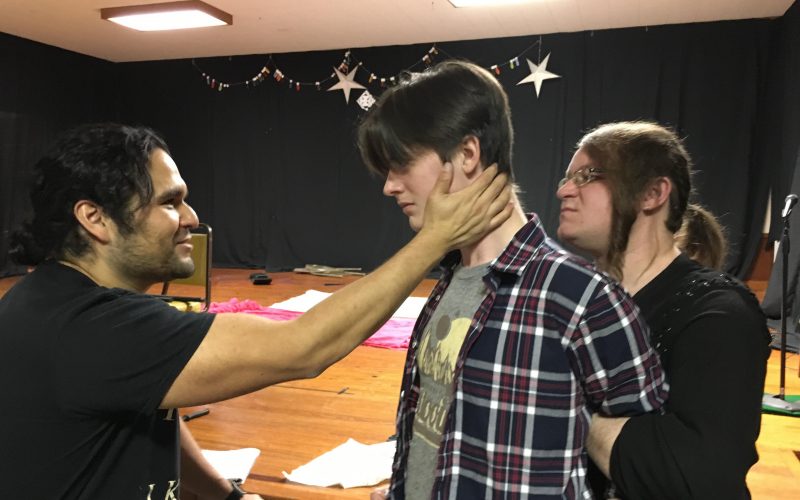“Why, I can smile, and murder whiles I smile,
“And cry ‘content’ to that which grieves my heart,
“And wet my cheeks with artificial tears,
“And frame my face to all occasions.
“Can I do this, and cannot get a crown?”
“He could have been a sympathetic character — could have been,” actor Charlie Rodriguez says of Richard of Gloucester, the anti-hero of Shakespeare’s history “Richard III.” He is, after all, “cheated of feature by dissembling nature, deformed, unfinish’d, sent before my time into this breathing world, scarce half made up, and that so lamely and unfashionable that dogs bark at me as I halt by them” — a hunchback, in simpler terms.
But Gloucester, as he is called in the text, is also a psychopath — narcissistic, dishonest, manipulative, outwardly charming but lacking in guilt, remorse and empathy. “What makes him even a little bit sympathetic is the piece of you you put in him,” Rodriguez says.
Rodriguez, an MFA student in acting at the University of Arkansas, chose “Richard III” as his thesis project and was fortunate to collaborate with the Crude Mechanicals for a school-break performance.
“I wasn’t super-familiar with ‘Richard III,’” admits Zach Stolz, one of the company’s founders. “And when I grabbed it and started reading it, it scared me. It’s big, long, dark, complicated, with complex characters and no easy answers. And I couldn’t stop seeing modern parallels — people rising to power through abuse and manipulation of those around them. Richard is so disingenuous in how he appeals to his peers, how he plays everybody and cons an entire country into supporting a man who is out only to serve himself.”
Written around 1592 and set in 1471, “Richard III” opens with some of the most famous of Shakespeare’s words: “Now is the winter of our discontent.” The Duke of Gloucester, having already killed the Prince of Wales, sets out to woo his widow, Lady Anne; plant doubt in the mind of King Edward IV about his friends and courtiers; and remove any and all barriers to putting the crown on his own head — whether by murder, treachery or eloquent lies, some told directly to the audience. At the heart of the tale is the question: “Are monsters born — or made?”
“There are so many parallels we could draw — but mostly, we’re going to let the audience draw their own,” Stolz says. “The timeliness is incredible.”
Time is always of the essence to the Crude Mechanicals, a company formed because actors wanted to work while home from college on Christmas break. This year, Stolz, who is finishing his master’s degree at the University of Alabama, recruited 10 actors for two weeks of rehearsal before performances Jan. 5-7. To make the three-and-a-half-hour play shorter and more accessible, he’s gone modern with costumes and props — no sword fights, but instead guns and knives — and “turned some of the more heavy exposition” into news casts in modern English.
“The play is so intimate and immediate,” says Stolz. “We don’t want to give the audience room to disengage. Shakespeare was writing this warning to us 400 years ago — and look where we are.”
__
FAQ
‘Richard III’
WHEN — 7:30 p.m. Jan. 5-7
WHERE — Arkansas Union ballroom on the University of Arkansas campus in Fayetteville
COST — Free
INFO — Email crudemechanicals@gmail.com



